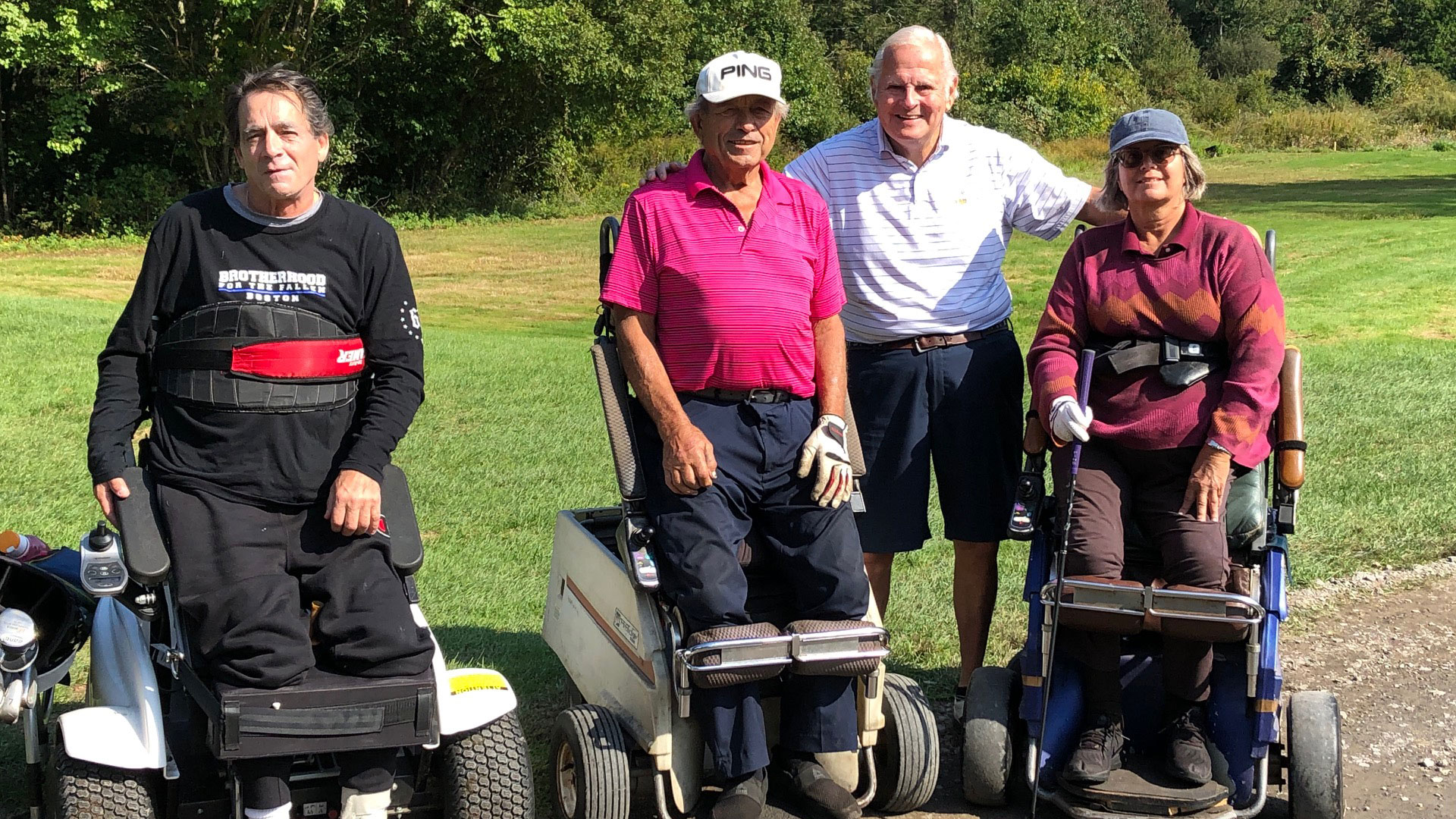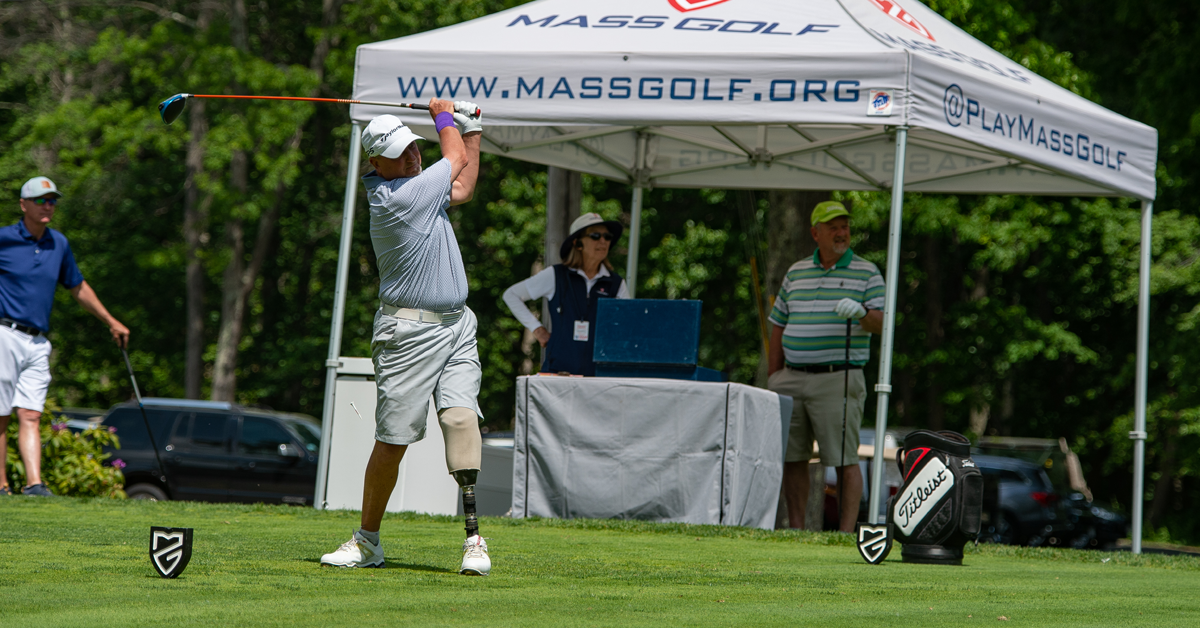Jerry Donovan remembers the date well. It was June 1, 1999, when Donovan was driving his work truck near the Prudential Center in Boston on a steamy late spring day. A diabetic, Donovan’s blood sugar dropped dangerously low, and next thing he knew his body was crushed under the weight of his truck.
Donovan suffered a T6 spinal cord injury that left him paralyzed from the chest down and in comma for two months. Survival odds were not promising.
“A priest gave me last rights, and I said to the Lord, “If you keep me alive, I will do [stuff] for good people who are damaged,” Donovan said.
Despite the gruesome injury, Donovan pulled through and wanted to make sure he and others in similar physical condition could have an active and fulfilling life. Like many individuals living with permanent disabilities, Donovan has found comfort in golf. He discovered the sport during a clinic at Spaulding Rehabilitation and became one of the first to own a Paramobile, an an all-terrain, heavy-duty wheelchair that allows physically-impaired individuals to stand up to swing and navigate the golf course.
He also co-founded the organization Golf For All alongside Fred Corcoran, an outstanding and accomplished tournament player with a rich family history in golf. (His uncle, Fred Corcoran, is in the World Golf Hall of Fame and father, Bill, was Executive Secretary of what was then the Massachusetts Golf Association).
Stories like Donovan are among those that have resurfaced following a major announcement made by the United States Golf Association (USGA) at the end of last year. The USGA has launched the inaugural U.S. Adapative Open — a national championship that will showcase the world’s best golfers with disabilities — will take place July 18-20 at Pinehurst Resort in North Carolina.
“It’s great that the governing bodies are finally recognizing the vast number of special golfers who can add so much to the game,” Corcoran said. “Golf is too great a game to not be inclusive.”

The championship will be contested over 54-holes of stroke play on Pinehurst No. 6. It is open to males and females, professionals and amateurs, with either physical impairment, sensory impairment (vision), or intellectual impairment, who have a WR4GD Pass as well as a Handicap Index®. The field will consist of 96 players. Further eligibility requirements, field composition and other competitive format details of the U.S. Adaptive Open Championship will be announced at a later date.
The championship delivers on a promise made by the then-USGA president Diana Murphy during the USGA’s annual meeting five years ago.
“We are reinforcing our commitment to make the game more accessible through supporting disabled golfers in a more meaningful way,” Murphy said. “We have given community grants for many years, but it is the right time to expand that support into a deeper review of modifications to the Rules of Golf and equipment rules for disabled golfers. We are also looking to celebrate their achievements through a national championship, and although we have a lot of work to do, we welcome the opportunity to work with other organizations to realize this goal.”
Among those excited to hear the news was Lynne Lazaro, a sighted member of the United States Blind Golf Association. Lazaro is the daughter of Joe Lazaro, a legendary blind golfer from Waltham and a member of the Massachusetts Golf Hall of Fame.
“Dad would be ecstatic that golfers with disabilities are finally being recognized,” said Lazaro, who has worked with PGA Professional Bob Beach, Director of Golf For All, to find and develop more visually impaired golfers with the hope they can eventually compete in national events.
Donovan said he’s been working with Beach for years to develop a smooth, consistent stroke. He can’t turn his hips, he’s developed a one-armed swing and his drives often find the middle of the fairway.
Though his primary goal is to find and train more golfers with disabilities, Donovan said he’s inspired more than ever to begin keeping score, get a Handicap Index®, and try to enter competitions like the U.S. Adaptive Open.
“Now that I’ve trained a couple people, it’s pushed my competitive juices,” he said.
Pittsfield native Steve Terpak (Wyckoff CC) is among those who has confirmed his interest in competing in this year’s championship. Terpak, 62, was involved in a horrific motorcycle accident back in 2005 that left him comatose at times, bed-ridden for two years and eventually with an amputated left leg from the knee down.
But decades later, Terpak has thrived in the clannish world of adaptive golf. Last year, he won the Senior Division of the U.S. Disabled Senior Open and has won the last two National Amputee Golf Association Championships (Senior Division). Now Terpak is thrilled to have a “third major” added to the mix.
“What a fantastic opportunity this is for us to play a bucket list type golf course and golf resort,” Terpak said. “Personally I have never played any of the Pinehurst courses and am definitely excited to participate.”

Beyond the competition itself, Terpak said meeting other people and hearing their stories makes adapative golf so gratifying.
“I have made some lifelong friends and met some of the highest quality people participating in these disabled events,” he said. “It always amazes me the human spirit and joy I witness and I’m always humbled. I wish every golfer, or anyone for that matter, could witness and experience the dedication, effort, and adversity displayed at these events. It could literally affect people in a profound and positive way. Listening to different individual stories of tragedy and overcoming adversity is inspiring to say the least. That is really why I am so happy to see the USGA step up and create this event. I hope it lasts for decades or more to display the human spirit and the spread of hope to others with disabilities.”
Needham’s Bob Resnick is a visually-impaired golfer who at age 50 developed retinitis pigmentosa, a rare, genetic disorder that involve a breakdown and loss of cells in the retina. Now 69, Resnick said he’s glad to see more competitions arise for golfers with disabilities and hopes the awareness will create more equitable treatment on average golf courses.
“The tricky part about going out is it takes time to set up a blind golfer, so the person I’m with, they have to line me up for my ball,” he said. “It slows down play and you don’t want to back up other parties, and you start to feel pressure, even when you’re playing well.
“It’d be nice to play un-pressured golf because I want to do well and want to compete.”

But like Terpak, Resnick said he’s largely had positive experiences with the sport. A former tennis player for Tufts University, Resnick said golf has given him a new avenue to compete.
“When I tell people I play blind golf, they can’t believe it,” Resnick said. “It’s given me an opportunity to meet a group of people I wouldn’t have met.”
And while the tournament itself is a little less than half a year away, Donovan said the prep work for the upcoming season begins now.
“I’m ready to rip it up this year,” Donovan said. “Half of being good is feeling good. I have a net in my back yard, and I have my own machine. And every day it’s above 50 [degrees], I’ll be out there.”